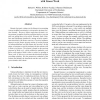Free Online Productivity Tools
i2Speak
i2Symbol
i2OCR
iTex2Img
iWeb2Print
iWeb2Shot
i2Type
iPdf2Split
iPdf2Merge
i2Bopomofo
i2Arabic
i2Style
i2Image
i2PDF
iLatex2Rtf
Sci2ools
107
click to vote
IEEEARES
2007
IEEE
2007
IEEE
On Coercion-Resistant Electronic Elections with Linear Work
Remote electronic voting over the Internet is a promising concept to afford convenience to voters and to increase election turnouts. However, before employing electronic voting systems in regular elections, problems such as coercion and vote selling have to be solved. Recently, Juels, Catalano and Jakobsson introduced a strong security requirement that deals with theses concerns. Coercion resistance improves on the former security notion of receipt freeness by taking additional real-life threats into account. In this paper, we present a coercion-resistant election scheme with a linear work factor. The scheme is based on the previous proposal of Juels et al., which exhibited a quadratic work factor, and employs Smith’s idea to achieve a speedup to linear work. It, however, overcomes the drawbacks of these preceding solutions. We also present an evaluation of the scheme and identify the drawbacks and the real world aspects related to the scheme.
Coercion-resistant Election Scheme | Electronic Voting | IEEEARES 2007 | Security Privacy | Work Factor |
| Added | 03 Jun 2010 |
| Updated | 03 Jun 2010 |
| Type | Conference |
| Year | 2007 |
| Where | IEEEARES |
| Authors | Stefan G. Weber, Roberto Araujo, Johannes Buchmann |
Comments (0)

